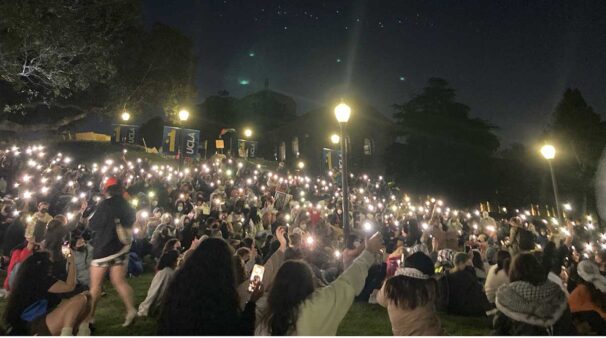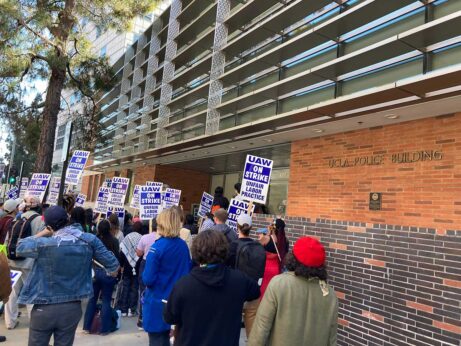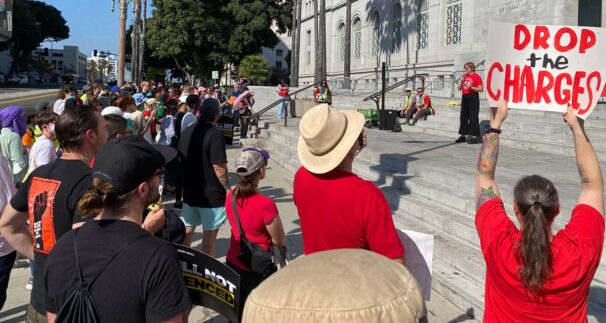
Editor’s note: On June 7, a Republican-appointed Orange County Superior Court judge granted the request by area universities temporarily restraining, until June 27, rolling strikes on California college campuses that university workers and students have been conducting against the war on Gaza.
Student workers and their unions are undeterred in their fight for a ceasefire and an end to the genocide in Gaza, however. They held a “Drop the Charges Rally” on June 14 at Los Angeles City Hall, where they received the backing of local councilmembers Hugo Soto-Martinez and Eunisses Hernandez.
The story that follows tells how a powerful ceasefire movement enveloped California campuses and how the authorities fear the students may actually succeed in reversing U.S. and university backing of the Israeli war machine.
LOS ANGELES—Graduate student unions at the University of Southern California (USC) and the University of California at Los Angeles (UCLA) are demanding their institutions stop crackdowns on student protests against genocide in Gaza and that they cut off the supply of money the universities are pumping into the Israeli war machine.
After the mass deployment of militarized police on the campuses and the arrest of hundreds of students and workers between April 24 and May 6, the United Auto Worker locals representing graduate workers on campus filed grievances, unfair labor practice charges, and rallied students to publicly demonstrate to force the universities to drop the charges against demonstrators.
UAW 4811, the UC system local, passed a strike authorization vote with a 79% supermajority of participating members, while UAW 872, the USC local, protested in front of President Carol Folt’s home for two Monday mornings in a row. Both unions have refused to back down from holding university administration accountable in light of egregious and disproportionate deployment of violence to come down upon peaceful protests.
Standing up for Gaza
After what students and workers described as UCLA’s abuse of and retaliation against its workers for exercising their free speech and other rights, UAW Local 4811 filed unfair labor practice charges against their institution on May 3. The union amended their filing on May 10 and 17 to include further violations that had occurred at UCLA.
The charges include interference with and retaliation against workers exercising their right to peacefully protest, unilaterally changing working conditions by cracking down on protected free speech, and failing to ensure worker safety by allowing violent attacks against protesters.
On May 20, workers at the UC Santa Cruz were the first called up to withhold their labor in a rolling strike. UCLA and UC Davis were the next two campuses, starting May 28, to “stand up.” Union leaders opted for what they called a “stand up” strike, following the example of a historic, successful strike of auto workers last fall. Different campuses were called at different times to begin withholding their labor.
As part of the demands, UAW 4811 workers call on the University of California to negotiate in good faith with all stakeholders, including the union and the coalitions that organized the student encampments, and to address and resolve the concerns raised by protesters. In addition, they amnesty for all academic employees, students, student groups, faculty, and staff who faced disciplinary action or arrest.
Further demands include protection of the right to free speech on campus, disclosure of and divestment from companies profiting off the war in Gaza, and empowering researchers to opt out of funding sources tied to the war.
In response, the UC has argued that the strike is illegal and has filed two injunctions with the California Public Employment Relations Board, seeking an immediate end to the strike, both of which PERB denied, as the UC failed to meet evidentiary standards.
The “standup strikes” were not the beginning of UAW’s solidarity with Palestine. UAW 4811 President Rafael Jaime told People’s World that he helped pass a statement from the executive board of the local (then UAW 2865) calling for an immediate ceasefire in Gaza back on Oct. 13, 2023. Likewise, on Oct. 17, USC’s union leadership called for a ceasefire, recognizing the genocidal war as an escalation of years of apartheid and occupation in Gaza.
Jaime said, “Our local also worked with our national executive board in order to encourage the UAW international to become the first major labor union in the country to also take a stance and call for a ceasefire in Gaza.” This resolution was passed on Dec. 1.
Encampments met with violence
When the Gaza Solidarity Encampment movement launched at UCLA in late April 2024, UAW 4811 members were on the front lines. The encampment at UCLA, set up on Dixon Court lawn, was organized by a coalition of groups including Students for Justice in Palestine UCLA and UCLADivest, which were largely undergraduate-led but also included graduate students.
Jaime stated that he first went to the encampment on Sunday, April 28, in response to a call for support that went out on social media to protect the students from increasingly aggressive anti-Palestinian counter-protests and agitators.
“I went there originally just to be part of the crowd and to support our colleagues and co-workers and students in the encampment, but you know it quickly escalated,” he explained, noting that the counter-protesters became aggressive “almost immediately.”
This aggression included verbal assaults, pushing, and attempts to tear down the barriers students had erected to protect the encampment. In response, Jaime and a number of other UAW workers, students, and community supporters formed a protective wall between the encampment and counter-protesters.
“It lasted for many hours, and during that whole time, those of us there encountered a lot of abuse from the anti-Palestinian protest,” he said. Eventually, the counter-protesters left, and, according to Jamie, the divestment activists were able to “hold the line, making the action a success.”
The violence was far from over, however. On the night of Tuesday, April 30, a group of Zionists, white supremacists, and other masked agitators returned to campus and violently attacked the student encampment. Jaime explained that he had been at home that evening when he received messages from friends in the encampment saying that they were under attack and needed help.
After rushing to campus, Jaime and many UAW colleagues went directly to the barricades to try once again to hold the line against the assault. The outsiders’ violence reached unprecedented levels that night. “They tried to tear it apart. They were physically attacking people, they were macing us, throwing objects at us. And the whole time, there was just nobody, there was no university security presence,” Jaime said.
Widely-circulated video footage from the night confirms all these methods of violence. Videos showed the outside attackers shooting fireworks into the encampment, which could have easily set fire, hitting student protesters with wooden boards, throwing objects into the camp, and verbally assaulting the student protesters, including with racist and sexist slurs.
Livestream video from the night on social media showed masked men attacking the encampment with impunity as protesters tried to protect themselves and each other.
Stood there and did nothing
Perhaps even worse, Jaime noted that “the police just stood there and watched it happen for like about an hour” and that when they finally moved in to push the agitators out, the assault had already been going on for many hours.
The university’s utter failure to protect its students, faculty, and workers was widely criticized in the following days, particularly in a number of letters signed by faculty of different departments.
The University of California, on May 1, declared the encampment unlawful and called in police to clear it. A massive force of officers from multiple departments, including UCPD, California Highway Patrol, the L.A. County Sheriff’s Department, and several private security agencies, descended on campus.

In response, union leaders quickly organized a solidarity rally outside the encampment. Originally scheduled for 7 p.m. on the evening of May 1, leadership moved the rally up to 5:30, just half-an-hour before they expected police to launch a 6 p.m. raid. According to Jaime, the goal of this action was to bolster the encampment and to “protect it as best we could.”
He notes that, because of the incredible numbers and support from UAW members and other students and community supporters, “we were able to push back the police until I think around two or three o’clock in the morning, until [the police] eventually made their way into the encampment by using just brute force, including flashbang grenades and rubber bullets to suppress the protests.”
Ultimately, however, despite the immense community support, the police swept the encampment, arresting over 200 people and causing numerous injuries. These violent arrests, repeated on other UC campuses, are a pivotal element of the union’s unfair labor practice charges.
Riot police carry out mass arrests

On April 24, 2024, students in the encampment initiated by the Divest from the Death coalition at the University of Southern California engaged in peaceful protest until the campus administration there too brought in additional security and called the riot police. According to the vice president of UAW 872, Anna Weiss, “It was really scary, having that many cops in full riot gear showing up because of a group of primarily students hanging out on the grass together and protesting together peacefully.”
Weiss added that at every step of the way USC administration has chosen to take increasingly escalatory measures toward student protesters or those exercising their right to free speech in support of Palestine. They started off by calling the riot police and arresting almost a hundred people.
Then, to everyone who was a student in the group of arrestees, USC sent emails threatening disciplinary action and warning recipients that if they participate in any further forms of protest that they would be subject to more disciplinary action, up to and including expulsion.
In response, the USC Graduate Student Union filed an unfair labor practice charge with the NLRB. “We are saying that the University of Southern California violated the National Labor Relations Act initially in three ways,” Weiss explained to People’s World.
First, there was the retaliatory action of summoning the police to arrest university employees engaging in protected concerted activity. Similar to the operations conducted by police on other campuses, such as Columbia, NYU, and Yale, the LAPD entered campus with tear gas launchers, heavy weaponry, and riot gear.
Students were trampled to the ground, forcefully arrested, and subjected to discriminatory physical abuse. Faculty and graduate workers were also arrested.
The second ULP charge concerned the university unilaterally changing workplace conduct policies by prohibiting pro-Palestine speech at the worksite, ejecting employees engaged in political speech from their own worksite as trespassers, and threatening employees with disciplinary actions in response to non-violent political speech.
And the third was unilaterally changing workplace policies in terms of access to campus. USC administration restricted access without conferring with the union first and required students and employees to show identification at security checkpoints in order to enter the worksite.
Teaching Assistants who had students unable to make it onto campus had to schedule extra sessions to do makeups. Leading up to graduation, USC increased the security and restriction to access to campus even further, limiting entry to only two sites on the external perimeter of the campus, far away from the nearest transit stations.
They added an internal perimeter of security checkpoints to restrict mobility within the campus itself. In particular, many grad student workers were not able to physically get to their work site for work they needed to do that day.
After the intensification of USC retaliation under the pretext of campus safety, the Graduate Student Union amended its ULP complaint to include the employer confiscating items from employees during bag checks, which many graduate workers have complained are racially biased and discriminatory toward students of color.
Union action on the ULP charges and grievances is helping put legal pressure on the university. However, “the thing that actually gets them to move their position is power outside of that” Weiss said.
To demonstrate that grad workers have collective power and are willing to show up for their colleagues as well as stand in solidarity with Palestine, the Graduate Student Union organized two “Wake up calls” at USC President Carol Folt’s house with demands to drop the charges and, repeating the main demand of encampment activists, divest the university’s financial holdings from the State of Israel or connected corporations.
Additionally, on May 7, the Graduate Student Union organized a rally at which Tom Morello of Rage Against the Machine fame performed and numerous speakers, including a law school faculty, a concerned parent, and a healthcare worker unionist, gave remarks on the problems caused by the university’s complicity in genocide.
Exposing deep ties to the war machine
Salem Elzway, a USC postdoc at the Society of Fellows in the Humanities and historian of automation, artificial intelligence, and robotics, has researched the connections between the military-industrial complex and universities. His early work culminated in an article for the Michigan Historical Review titled “Pentagon Midwest,” which exposed the University of Michigan as one of the largest defense contractors among U.S. universities.

In line with these deeply-rooted connections between academic science and the military, USC is one of the largest recipients of both industry and federal government support for computer science and artificial intelligence. It is home to one of the U.S. Army’s most important research laboratories on the West Coast.
“Many universities, because of pushback from anti-war protesters [in the 1970s] that were fighting back against military research, would…start to spin off their defense contracting into individual labs that are off campus. But they’re the administrator of these things. The contracts are through USC, so there is a really deep relationship with USC to the military-industrial-academic complex,” Elzway said in an interview with People’s World.
As a postdoc, Elzway taught the first-ever history of artificial intelligence course at USC and was able to connect with students on these topics prior to the encampment. “I was very in support of [the encampment],” Elzway said. “I think that universities have a very critical role for not just undergraduates but all community members of the university to be a place where we can actually have very, very difficult conversations,” Elzway explained.
He was among the many academic instructors at USC whose students were arrested at the protests. “One of my students was eventually actually arrested at the encampment and spent ten hours in jail,” Elzway said. “The fact that you have police cracking down on these things…what that does is actually demonstrate to individuals who are in the encampment, people like us, who are supportive of it, that these things actually do have power,” he added.
“When it comes to the university…they have a vested interest in maintaining certain kinds of relationships to the U.S. defense sector specifically, and the U.S. defense sector has very, very deep ties to the Israeli government and the Israeli defense sector,” Elzway said.
In fact, a major industry in L.A.’s economy is weapons manufacturing. When it comes to manufacturing generally, defense companies make up the largest share of employment, and the development of the city’s economy is critically dependent upon the military suppliers.
According to Elzway, USC has been growing increasingly intertwined with such activity. “I think, in the past 20 years, if I remember the numbers correctly when I was looking at the statistics, USC has done over $7 billion in defense-funded research,” Elzway asserted.
“To force our institutions to move towards divestment…we have to start organizing. We have to really start taking seriously withdrawing our labor and our services from the university because they’re not going to respond otherwise. We already know what the response has been, that’s calling in the police. It’s a variety of different administrative actions. It’s trying to kick the can down the road,” Elzway asserted.
“This isn’t just about divestment from Israel…. This is divestment from fossil fuel industries. This is about divesting from an entire capitalist model of how universities are run. This is about the jobs crisis…. All these things are actually really tied into each other,” Elzway said. “The last thing they ever want is they don’t want democracy. They don’t want any democratic control over how the university is run,” Elzway concluded.
So now, everyone waits for a ruling from a GOP-dominated court and whether it will permanently ban the strikes. No one, however, expects that the students and workers will ever give up their struggle for a ceasefire and an end to the genocide in Gaza. Not here in Los Angeles or anywhere else across the country.











